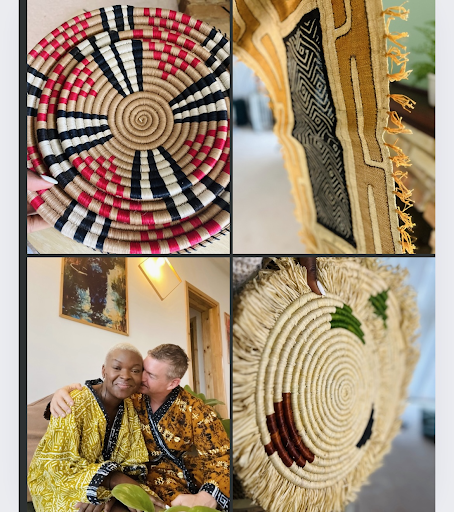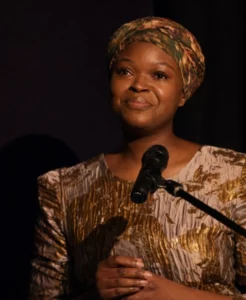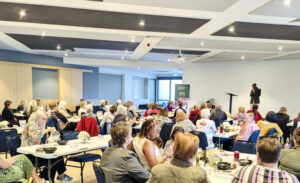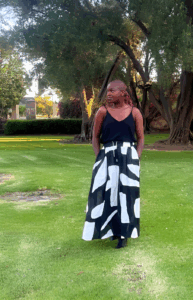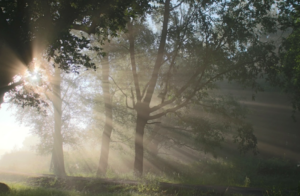The Power of Embracing Who We Already Are: A Lesson from Rwanda
“I packed an extra bag for us,” my forward-thinking partner murmured, tracking my every move as I floated through a Kigali art shop—arms overflowing, eyes sparkling, heart gloriously unraveled.
I scooped up hand-woven fans, grass baskets, straw mats—plucking them from the shelves as if they were on the brink of extinction. Their beauty froze me mid-stride. It felt sacred, as though I were gathering lost pieces of myself.
Relief washed over me. Moments earlier I’d been negotiating with my suitcase: How many jeans and blouses can I ditch before customs raises an eyebrow?
These weren’t souvenirs.
They were memory.
They were identity.
They were stories—my stories—reborn in color and fiber.
If the choice was Australian fashion or African heritage, culture would win. Every time.
Honestly, if my partner hadn’t leaned in and whispered, “Babe, that’s enough,” I might have tried to buy the whole shop. (Customs, have mercy.)
When the familiar feels worthless
Hours later, high above the continent, woven treasures rustled in my carry-on while I sketched in my mind where each piece would live in our Perth home—walls, shelves, bedside, everywhere—and still it felt like not enough.
Why this sudden craving for baskets and mats? These were the very items I’d stepped over in childhood. Back then:
- Fans simply cooled the air when the power failed.
- Baskets carried mangoes, groundnuts, kola nuts.
- Mats softened my grandmother’s mud-hut floor while we ate, laughed, and prayed.
Nothing about them felt special—just ordinary life. If anything, they symbolized what I wanted to escape: poverty, limitation, the “backwardness” I believed Australia would cure.
So when I migrated, I didn’t just pack clothes—I packed shame.
I trimmed my accent.
I muted my presence.
I hid my passions.
I convinced myself any trace of the old life would sabotage my chance to belong. And the world around me nodded: Blend in. Disappear.
So I did—piece by painstaking piece.
What changed? What made these items suddenly appealing to me ?
Well, Rwanda changed.
Oh, Rwanda! Rwanda turned everything upside down. Or rather, it turned it right side up.
In Kigali, I saw the same everyday African artefacts—fans, mats, fabrics—styled with such elegance and intention that they belonged on magazine covers.
They weren’t hidden in shame. They were elevated in pride.
Baskets adorned walls like paintings.
Fans hung like museum pieces.
Mats became statement rugs in high-end homes.
The air didn’t just feel clean—it felt whole.
What struck me most wasn’t just the aesthetics. It was the audacity. The way Rwandans had reimagined the things we were told to forget.
They took what was once overlooked—everyday, familiar, even dismissed—and turned it into something to be revered.
Not by chasing something new, but by reclaiming what was already theirs.
They polished it. Embodied it. Stood proudly in it.
And now, they’re modelling it to the world with such grace and confidence that even I couldn’t resist—I bought into it, wholeheartedly.
From Survival to Style
Back in Nigeria, those same items represented survival.
In Rwanda, they now represented style.
And that transformation wasn’t accidental. It was spiritual.
Because you see, Rwanda is no stranger to suffering. The country’s history is marked by the brutal genocide of 1994—where more than 800,000 lives were taken in just 100 days.
But walking through Kigali today, you would not sense death. You would sense dignity. You would sense vision. You would sense a people who refused to stay buried in the soil of their suffering.
They didn’t erase their past. They reworked it.
They didn’t abandon their identity. They restored it.
They didn’t ask for the world’s approval. They embodied their own.
And that, to me, is power.
We are all seekers
Look around any airport lounge, scroll any social feed, listen to the conversations in cafés: everyone is looking for something— a breakthrough, a new title, a bigger platform, a clearer brand. We are professional seekers. The problem? Most of us are looking out there.
We upgrade our wardrobes, our laptops, our locations. We study algorithms like sacred scripture. We chase the next certification, the next collaboration, the next “five-step framework.” But rarely do we pause long enough to explore the most obvious terrain:
Ourselves. What do you have inside you that only requires you to polish it?
Rwanda explored its own identity, elevated it, and positioned it as luxury.
Baskets became wall sculptures.
Fans became design statements.
Mats became gallery rugs.
They told the world, “This is who we are, and you will see the beauty in it.” And I did. I bought it—gladly.
The Real asset inventory
Let’s turn the mirror on ourselves. Instead of hunting for the next trend, what if we conducted an honest inventory of what we already possess?
- Your accent that you keep trimming around the edges.
- The story you survived but rarely tell.
- The talent you call “just a hobby.”
- The compassion you carry like an afterthought.
Have you explored these the way Rwanda explored baskets and fans? Have you polished them, framed them, let light hit them from new angles?
Positioning Yourself as style and substance
Imagine presenting your authentic traits the way a high-end boutique curates a collection:
Confidence Hanging Rack
- Speak the unfiltered version of your story. Watch how honesty attracts curiosity.
Passion Display Table
- Showcase that “small” gift—music, writing, organising—like a centre-piece. Small for you can be monumental for someone else.
Heritage Spotlight Wall
- Place your roots in plain view: the rituals, foods, proverbs, or dances that shaped you. Give them stage lights.
When you position who you are with the same reverence Rwanda gives its crafts, people stop seeing “ordinary.” They start seeing value.
Permission is an inside job
You might think, “Sure, but will anyone buy into my story?”
My answer: They already do—you’re the one who hasn’t bought in yet.
Rwanda didn’t wait for an international style magazine to bless its aesthetic. The nation blessed itself first. The world simply followed the cue.
Likewise, your gifts, voice, and unique tapestry become compelling the moment you decide they are. That decision grants the audience permission to agree.
a simple exercise
- List five traits, experiences, or passions you’ve under-valued.
- For each one, write a sentence that begins:
“If I honoured this fully, it could help others by…” - Choose one item from the list and feature it boldly this week— in a conversation, a social post, a meeting, or your workspace.
Watch how people respond when you treat your identity as an asset instead of an afterthought.
Final Words
We are all seekers, but the treasure hunt ends right where it began—in the mirror. The story you’re chasing out there is already living in your language, your laughter, your scars, your dreams.
Explore you. Curate you. Position you.
Make your life a boutique of authenticity and let the world shop for inspiration.
Because when you frame who you are as style and luxury, people don’t just notice.
They pay attention, they pay respect, and sometimes—like me in that Kigali shop— they’ll pay cash.

